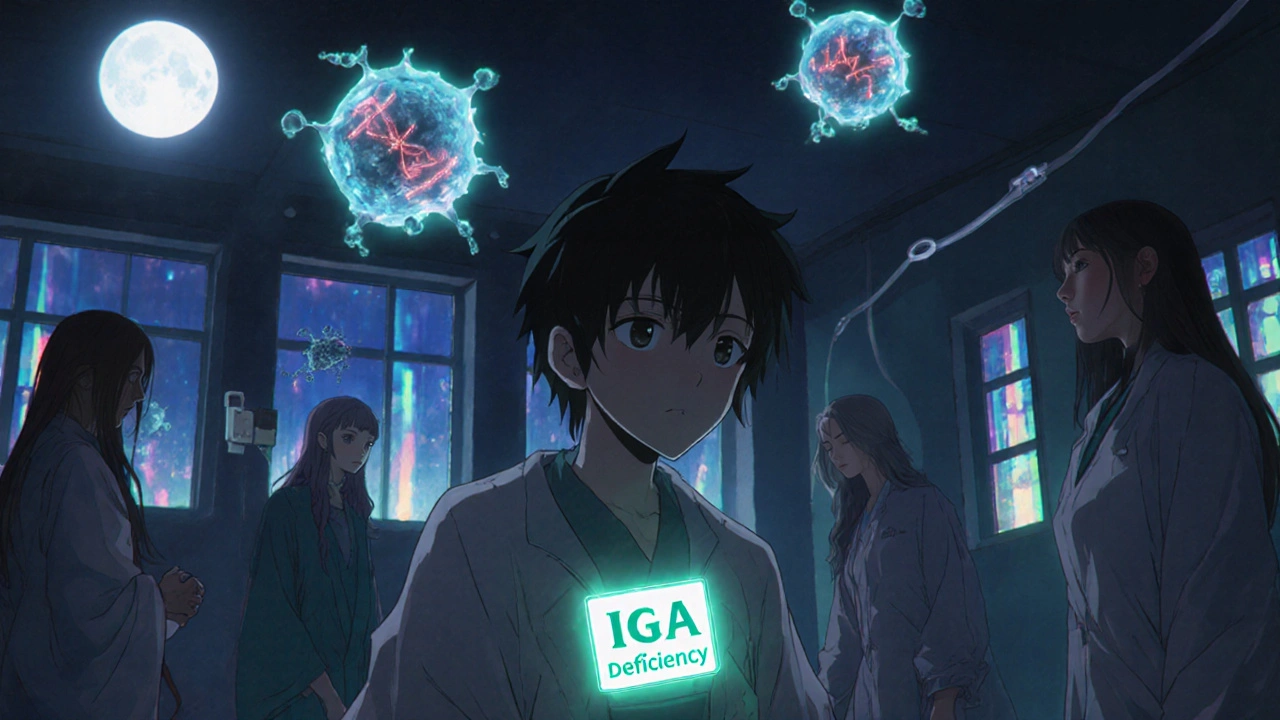Imagine needing a blood transfusion after surgery, but the very thing that’s supposed to save your life could trigger a life-threatening reaction. For people with IgA deficiency, this isn’t a hypothetical scenario-it’s a real, documented risk. IgA deficiency is the most common primary immune disorder, affecting roughly 1 in every 500 people in Caucasian populations. Yet most doctors, even in emergency rooms, don’t know about it. And that’s dangerous.
What Is IgA Deficiency?
Immunoglobulin A, or IgA, is the main antibody your body uses to protect your mucous membranes-your nose, throat, lungs, gut, and eyes. It’s your first line of defense against germs trying to sneak in through these surfaces. In people with selective IgA deficiency, the body produces little to no IgA-less than 7 mg/dL in the blood-while other antibodies like IgG and IgM stay normal.
This isn’t caused by drugs or infections. It’s genetic. If someone in your family has it, your chance of having it jumps 50 times higher. Most people never know they have it. About 90% of those with IgA deficiency live their whole lives without symptoms. But for the other 10%, the lack of IgA opens the door to problems.
What Symptoms Might You Experience?
If you’re in the minority who do have symptoms, they usually show up as repeated infections and autoimmune issues. The most common complaints are:
- Recurring ear infections (otitis media) - affects about 32% of symptomatic people
- Chronic sinus infections and bronchitis
- Pneumonia more than once
- Chronic diarrhea or giardia infections
- Celiac disease - nearly 1 in 10 people with IgA deficiency have it
- Asthma, eczema, or severe allergies - about 25% of symptomatic patients
These aren’t just annoying-they can lead to long-term damage. Repeated lung infections can scar the airways, leading to bronchiectasis. Untreated celiac disease can cause malnutrition and increase cancer risk. And because IgA normally keeps gut bacteria in check, its absence can trigger inflammation that leads to Crohn’s disease or ulcerative colitis.
How Is It Diagnosed?
There’s no single symptom that screams “IgA deficiency.” So diagnosis comes down to a simple blood test. Doctors check your IgA level, along with IgG and IgM. If IgA is below 7 mg/dL and the others are normal, that’s a clear sign. They’ll also test if you can make antibodies after a vaccine-like tetanus or pneumococcus-to rule out other immune problems.
The test is accurate-98.5% reliable-using standard lab methods like nephelometry. But here’s the catch: most doctors don’t test for it unless they already suspect an immune issue. That’s why many people go undiagnosed until they have a serious reaction to a blood transfusion.

The Hidden Danger: Transfusion Reactions
This is where IgA deficiency gets life-threatening. About 20% to 40% of people with this condition develop anti-IgA antibodies. These antibodies don’t cause problems on their own. But when they meet IgA in a blood transfusion? Boom.
Even a small amount of IgA in donated blood can trigger a severe allergic reaction. In fact, 1 in every 1,000 transfusions to someone with IgA deficiency and anti-IgA antibodies results in anaphylaxis. And it happens fast-85% of reactions start within the first 15 minutes.
Symptoms include:
- Hives or swelling (25% of cases)
- Low blood pressure (60% of severe cases)
- Wheezing or trouble breathing (45%)
- Cardiac arrest (10% of severe reactions)
And here’s the worst part: up to 10% of these reactions are fatal. That’s not rare. That’s preventable.
What Should You Do Before a Transfusion?
If you know you have IgA deficiency, you must tell every doctor, nurse, and emergency responder before any surgery or transfusion. But here’s the problem: 78% of serious reactions happen in emergency settings where no one knows your medical history.
So the first step is simple: wear a medical alert bracelet or necklace that says:
“Selective IgA Deficiency - Requires IgA-Depleted or Washed Blood Products.”
Carry a printed card in your wallet too. Make sure your primary care doctor and any specialists have it on file.
Before any transfusion, your blood should be tested for anti-IgA antibodies using an ELISA test. It’s 95% accurate-but even then, 5-10% of tests give false negatives. So if you have IgA deficiency, assume you have antibodies unless proven otherwise.
The solution? Two options:
- IgA-depleted blood products - specially processed to contain less than 0.02 mg/mL of IgA. These are the gold standard.
- Washed red blood cells - the blood is spun in a machine to remove plasma and IgA. It’s 98% effective but takes 30-45 minutes to prepare.
Both options cost 300% more than regular blood. Many hospitals don’t stock them. You may need to order them 48-72 hours in advance. That’s why planning ahead is critical.

What About Emergency Situations?
If you’re in an ambulance or ER and can’t communicate, the risk skyrockets. Some hospitals now keep IgA-depleted units on standby for known patients. But not all. In fact, 42% of IgA-deficient patients report being treated by staff who had never heard of their condition.
That’s why the Immune Deficiency Foundation recommends a three-part plan:
- Wear medical alert jewelry at all times
- Keep a signed letter from your immunologist in your wallet
- Register with a patient advocacy group that can notify emergency services if you’re unconscious
Long-Term Management and Monitoring
Even if you’ve never had a transfusion, you still need regular check-ups. Because IgA deficiency doesn’t just affect blood-it affects your whole immune system.
Recommended screenings:
- Annual blood test for celiac disease (tissue transglutaminase antibodies)
- Biannual lung function tests to catch early signs of bronchiectasis
- Quarterly check-ins for autoimmune markers like ANA or rheumatoid factor
For patients who need frequent transfusions, doctors may give a combination of methylprednisolone and diphenhydramine before the transfusion. This cuts reaction rates by 75%.
And while there’s no cure yet, new research is promising. Experimental treatments using lab-made human IgA are being tested in clinical trials. As of October 2023, only 12 people worldwide have received it. But it’s a sign that the future may hold real replacement therapy-not just avoidance.
What’s the Outlook?
The good news? Most people with IgA deficiency live normal, healthy lives. A 20-year study showed 95% have a normal life expectancy. The key is early diagnosis and avoiding transfusion risks.
The bad news? If you develop complications like severe lung damage or autoimmune disorders, your life expectancy can drop by 15-20%. That’s why awareness matters-not just for you, but for everyone around you.
If you’ve had repeated infections, unexplained diarrhea, or celiac disease, ask your doctor to test for IgA deficiency. If you’ve been told you’re allergic to blood transfusions without knowing why, get tested. This isn’t a rare curiosity-it’s a hidden condition with deadly consequences if ignored.
Can IgA deficiency be cured?
No, there is no cure for selective IgA deficiency. It’s a lifelong genetic condition. But most people don’t need treatment because they have no symptoms. For those who do, management focuses on preventing infections, monitoring for autoimmune diseases, and avoiding transfusion reactions by using IgA-depleted or washed blood products.
Can I donate blood if I have IgA deficiency?
Yes, you can donate blood if you have IgA deficiency. Your blood is safe for most recipients because IgA-deficient blood doesn’t contain anti-IgA antibodies unless you’ve been previously exposed to IgA through transfusion or pregnancy. However, you should inform the blood bank of your condition so they can label your donation appropriately.
Is IgA deficiency the same as celiac disease?
No. IgA deficiency is an immune system disorder where the body doesn’t make enough IgA antibodies. Celiac disease is an autoimmune reaction to gluten that damages the small intestine. But the two are linked-about 7% of people with IgA deficiency also have celiac disease. And because IgA deficiency can cause false-negative celiac tests, doctors often use IgG-based tests instead for diagnosis.
Do children outgrow IgA deficiency?
Sometimes, but rarely. In about 20-30% of children diagnosed before age 5, IgA levels may rise into the normal range by adolescence. But for most, especially those diagnosed after age 10, it’s permanent. Doctors usually wait until age 4 to make a firm diagnosis because IgA production naturally increases with age.
Should I avoid vaccines if I have IgA deficiency?
No. Vaccines are safe and recommended. People with IgA deficiency can and should receive all routine vaccines, including live vaccines like MMR and varicella. The immune system still responds normally to vaccines through IgG and IgM. In fact, staying up to date on vaccines is one of the best ways to prevent infections.
What should I do if I’m pregnant and have IgA deficiency?
Pregnancy doesn’t change your IgA deficiency, but it can increase your risk of developing anti-IgA antibodies, especially if you receive a blood transfusion during delivery. Inform your OB-GYN and the hospital blood bank. If you need transfusion during pregnancy or childbirth, insist on IgA-depleted or washed blood products. Your baby may inherit the condition, so discuss genetic counseling with your doctor.


Wait, so if you’re IgA deficient and get transfused, you could die from something as simple as a blood bag? That’s wild.
Of course the medical system ignores this until someone dies. They’d rather treat the anaphylaxis than prevent it. Classic.
My cousin had this and got a reaction during a C-section. No one knew. She coded. Took three rounds of epinephrine. Now she wears a bracelet and screams at every nurse who touches her IV.
They still don’t train ER staff on this. It’s not a rare disorder-it’s a systemic failure.
It is imperative to underscore the clinical significance of IgA deficiency in transfusion medicine. The prevalence of anti-IgA antibodies in IgA-deficient individuals is well-documented in peer-reviewed literature, with anaphylactic reactions occurring in up to 40% of exposed patients.
Standard protocols mandate pre-transfusion screening for anti-IgA antibodies via ELISA, and when positive, the use of washed or IgA-depleted blood products is non-negotiable.
Hospitals must establish institutional policies to ensure availability of these specialized components, particularly in trauma and surgical units. Failure to do so constitutes a breach of the standard of care.
my heart just sank reading this. i had like 3 pneumonia episodes as a kid and thought i was just ‘sickly’
turns out my mom had it too. we never connected the dots.
if you’ve ever had weird allergies or ‘mystery’ stomach stuff-please, get tested. it’s a blood draw. five minutes. could save your life.
and if you’re a doctor? stop acting like this is some obscure thing. it’s not. it’s everywhere.
Actually, most of this is outdated. IgA deficiency isn’t even considered a true immunodeficiency by the WHO anymore-it’s just a lab finding.
And the anti-IgA antibody thing? That’s only relevant if you’ve had prior exposure-like pregnancy or transfusion. Most people with IgA deficiency never develop antibodies.
Also, IgA-depleted blood is not FDA-approved for routine use. It’s off-label. Hospitals don’t stock it because it’s not standard of care.
People are overreacting to a 0.001% risk.
But… isn’t this just… evolution?
I mean, if your body doesn’t make IgA, maybe it’s not meant to. Maybe the universe is saying: ‘You’re not supposed to survive transfusions.’
And if you do? Well, you’re one of the chosen few who got lucky.
Why are we trying to engineer around nature?
Also, why are we still using blood? Isn’t that primitive? We should be growing organs in vats.
And what if IgA deficiency is actually a superpower? Maybe it prevents… I don’t know… allergic reactions to… everything?
Think deeper.
I’ve had IgA deficiency since I was 12. Never had a reaction. But I still carry the card. I still wear the bracelet.
Because one time, in the ER, the nurse said, ‘We don’t need to test for that.’
She didn’t even know what IgA stood for.
I didn’t yell. I didn’t cry. I just sat there, quietly terrified.
That’s the worst part-not the disease. It’s the ignorance.
This is a very important topic that needs to be addressed globally, especially in developing countries where awareness is almost non-existent. In India, for example, blood banks rarely have the infrastructure to provide IgA-depleted products, and most physicians are unaware of this condition.
Many patients with IgA deficiency are misdiagnosed as having chronic allergies or asthma.
There is an urgent need for medical education campaigns, inclusion of IgA deficiency in medical school curricula, and partnerships between NGOs and blood transfusion services to create regional repositories of specialized blood products.
Also, mobile health apps that remind patients to carry their medical alerts could be life-saving.
Let’s not wait for another preventable death.
Wait, so if I have celiac and get a transfusion, do I need to get tested for IgA deficiency too?
Because I’ve had 3 surgeries and never knew.
Should I be worried?
Just had my 4th surgery last month. Told them 3x. Nurse wrote ‘allergic to blood’ on the chart.
They gave me regular blood anyway.
Thank god I had a friend who’s a nurse in the OR. She caught it 2 minutes in.
They stopped. Switched. I lived.
But I’m done trusting hospitals.
I carry my immunologist’s letter, a printed lab report, and a QR code that links to my medical profile.
If you have this-do the same.
And if you’re a provider? Listen. Not just hear. Listen.
So the solution to a genetic condition is… more expensive blood?
How about we just stop transfusing people?
Or better yet-why don’t we just let nature take its course?
Some of us are just… not meant to survive surgery.
It’s not a conspiracy. It’s biology.
Also, I’ve heard IgA deficiency is just a myth invented by Big Pharma to sell more tests.
Just saying.
Let’s be real: 1 in 500 is not rare. That’s like 600,000 Americans.
And yet, the FDA doesn’t even require labeling of IgA content on blood bags.
Why? Because it’s inconvenient. Because it costs money.
And because the people who die from this? They’re not the ones writing the policy.
It’s not a medical issue. It’s a political one.
As a former military med tech, I’ve seen this. IgA deficiency? Total waste of resources.
We don’t have time for fancy washed blood in the field.
Give ‘em regular. If they die? They were weak anyway.
Plus, celiac is just gluten hysteria.
And if you’re allergic to blood, you should’ve stayed home.
Survival of the fittest, baby.
my grandma had this. never knew till she got a transfusion after hip surgery.
she lived.
but she’s 89 now and still wears her bracelet.
so yeah. do it. it’s not hard.
People who don’t get tested for IgA deficiency and then demand transfusions are irresponsible.
If you’re going to live with a genetic immune disorder, you have a moral obligation to know it.
And if you’re a parent? Test your kids.
Not doing so isn’t negligence-it’s selfishness.